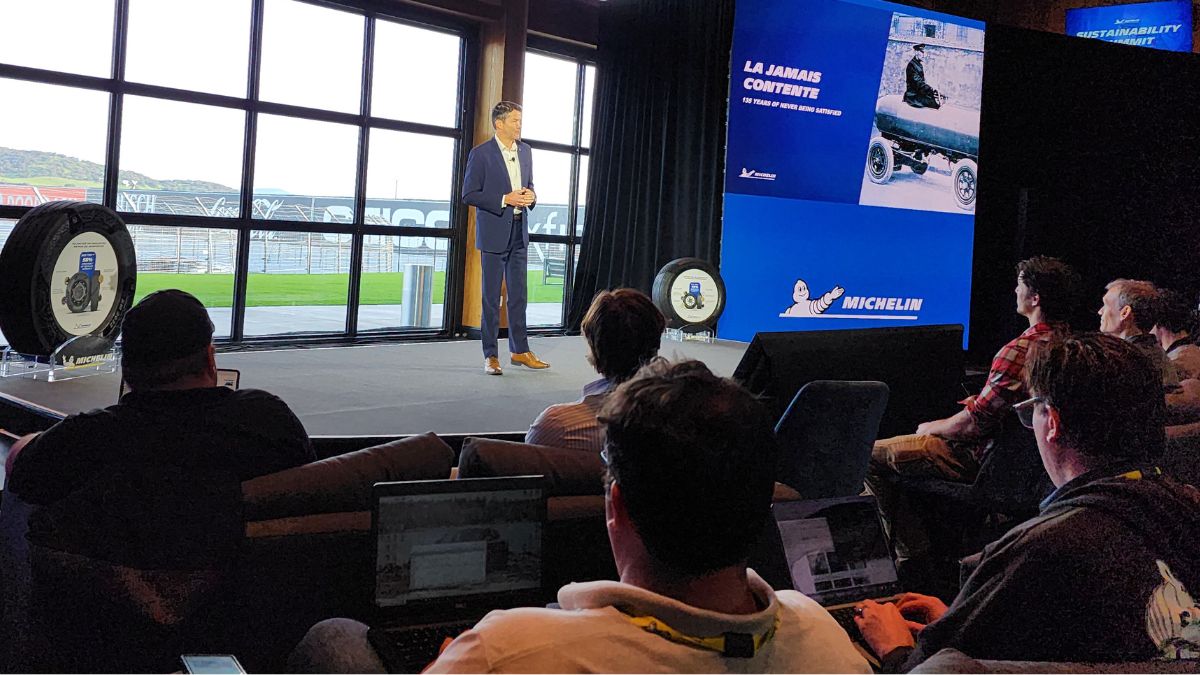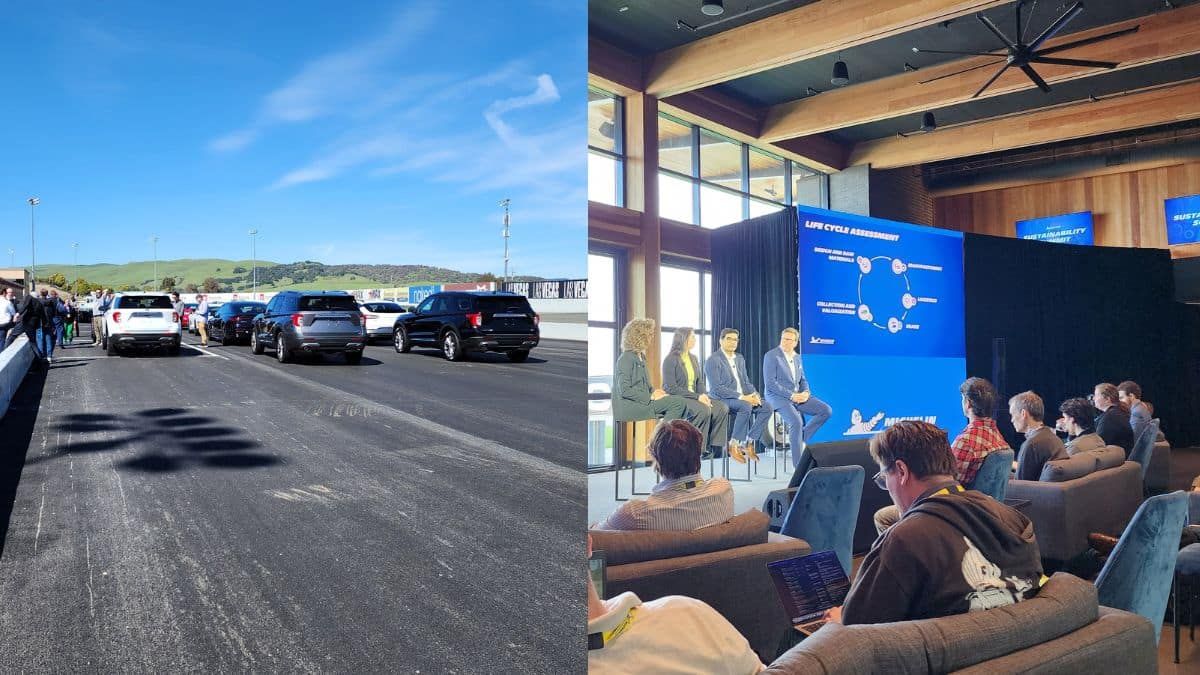Michelin recently hosted the Sustainability Summit, a platform to showcase its ongoing efforts and future direction in achieving sustainable mobility with EV-ready tires. About 25 automotive journalists, including myself, gathered at the beautiful Sonoma, California, where Michelin North America's CEO and his marketing team explained and shed light on the company's commitment to environmental responsibility, highlighting its journey and future aspirations. It was a very well-organized one-day summit, but by the end of the day, we all became tire experts, learning so much about our car tires and how they are made.
For example, would you imagine that your car tire isn't just rubber, but 200 materials are used in the recipe of making your car tires?
I would say the information from the Michelin Sustainability Summit was important and helpful to car drivers in several ways:
1. Michelin's focus on extending tire life (20% increase for passenger car tires) translates to significant cost savings for drivers. Fewer tire replacements mean less money spent.
2. Michelin's advancements in reducing rolling resistance contribute to better fuel economy for traditional gasoline vehicles. This translates to drivers needing to fill up less often, saving money on gas.
3. The summit highlighted how Michelin tires can extend the range of EVs by up to 40 miles. This translates to less "range anxiety" for EV drivers, allowing them to travel further on a single charge. By the way, last year we tested Michelin's CrossClimate2 tire which spanned 31,000 miles.
4. The information caters to drivers who are increasingly looking for environmentally friendly options. By choosing Michelin tires made with sustainable materials, drivers can contribute to a reduced environmental footprint.
5. Michelin's commitment to 100% renewable and recyclable materials by 2050 assures drivers that their tires are aligned with a sustainable future.
Michelin says it can build 100% sustainable from renewable and recycleable materials even now. But it will have to sacrifice rolling resistance and thus longevity. The goal to solve this is 2050. #MichelinSustainabilitySummit #Michelin pic.twitter.com/1lbyB7inMN
— Torque News (@torquenewsauto) March 13, 2024
Michelin's Pursuit of Sustainability:
While acknowledging the significant progress made, Michelin CEO Alexis Garcin emphasized that the company remains unsatisfied with the current level of sustainability achieved. This focus reflected a deep understanding on me that the journey toward a sustainable future is a continuous process.

I had an exclusive interview with Mr. Garcin and highly recommend watching it.
In this interview, which took place right at the end of the summit, we discussed Michelin's EV-ready tires and why out of eight EV manufacturers use Michelin tires and more. We also talked about topics related to Michelin's recipe for making sustainable tires as well as how Michelin's tires impact the range of electric vehicles.
Michelin's dedication to sustainability isn't a recent development. Their focus extends beyond simply producing electric vehicle tires. The company has a long history of promoting sustainable practices:
Michelin's executive said the company actively promotes extending tire life through retreading and repair services. This reduces the environmental impact associated with manufacturing entirely new tires.
The company's constant exploration of materials has led to advancements like airless tires, further reducing waste and resource consumption.
Interestingly, Michelin's Approach To Tire Manufacturing Is a Holistic One:
Michelin's executives said their commitment to sustainability goes beyond just the tires themselves. Their decision-making process prioritizes three key factors:
- People: Ensuring the well-being of their employees and fostering a safe working environment.
- Planet: Minimizing the environmental impact of their operations and products.
- Profit: Achieving sustainable business growth while adhering to their environmental and social responsibility goals.
So How Do They Make Those Sustainable Tires
Manufacturing a high-performance tire involves a complex blend of over 200 different materials. Michelin is actively working towards incorporating:
- 40% renewable and recyclable materials by 2030: This ambitious target signifies a significant shift towards a more sustainable production process.
- 100% renewable and recyclable materials by 2050: This long-term vision demonstrates Michelin's commitment to a completely sustainable future.
During the summit, Michelin offered a glimpse into their ongoing research and development efforts towards sustainable tire production. This includes friction reduction and safety without compromise.
Minimizing rolling resistance is crucial for both fuel efficiency in traditional vehicles and maximizing range in electric vehicles. Michelin's advancements in material science and design contribute to achieving this goal.
While prioritizing fuel efficiency and range, Michelin ensures their tires meet the highest safety standards.
Measurable Progress:
Michelin's dedication to sustainability is translating into tangible results, which include increased longevity, EV range boost and market dominance.
The company has achieved a 20% increase in the lifespan of their passenger car tires. This translates to fewer tires being produced and disposed of, reducing the overall environmental footprint.
Michelin tires can extend the driving range of electric vehicles by up to 40 miles. This signifies the crucial role tire technology plays in maximizing the efficiency of EVs.
Michelin tires equip 8 out of 10 electric vehicles in the United States, highlighting their position as a leader in sustainable mobility solutions.
At the summit, Michelin also showcased its latest innovation: road-ready passenger car tires made with 45% renewable and sustainable materials. This marks a significant step towards their ambitious goals and represents the first such tires available in North America.
After the initial introductions and presentations we spent most of the day test driving vehicles, some of which used Michelin's new tires that are made with 45% renewable and sustainable materials.
Watch this short video that shows those tires on a Ford Explorer.
Pushing the Boundaries on Semi Trucks:
They also showed us how their commitment extends beyond passenger vehicles. Their efforts in the Class 8 truck segment have resulted in tires that contribute to a 6% reduction in fuel consumption. This translates to substantial environmental benefits considering the vast number of trucks operating on the roads.
We saw specific Michelin's specific tires on the Supertruck 2 and I test-drove the Freightliner eCascadia, which was a great experience.
Key Takeaways That I Learned From The Summit, Which Can Benefit Torque News Readers:
- Michelin prioritizes sustainability as a core principle in their business strategy.
- The company actively explores solutions like retreading, airless tires, and sustainable materials.
- Michelin's focus extends beyond just tires, encompassing the entire ecosystem of people, planet, and profit.
- Their advancements in material science and design contribute to reducing rolling resistance, leading to improved fuel efficiency and extended range for electric vehicles.
- Michelin demonstrates a strong commitment to achieving ambitious sustainability goals by 2030 and 2050.
In essence, the Michelin Sustainability Summit empowers car drivers to make informed decisions that benefit both their wallets and the environment. The information provided valuable insights into how tire technology is evolving to be more sustainable, fuel-efficient, and cost-effective, ultimately leading to a more responsible driving experience.
Armen Hareyan is the founder and the Editor in Chief of Torque News. He founded TorqueNews.com in 2010, which since then has been publishing expert news and analysis about the automotive industry. He can be reached at Torque News Twitter, Facebook, Linkedin, and Youtube. He has more than a decade of expertise in the automotive industry with a special interest in Tesla and electric vehicles.





